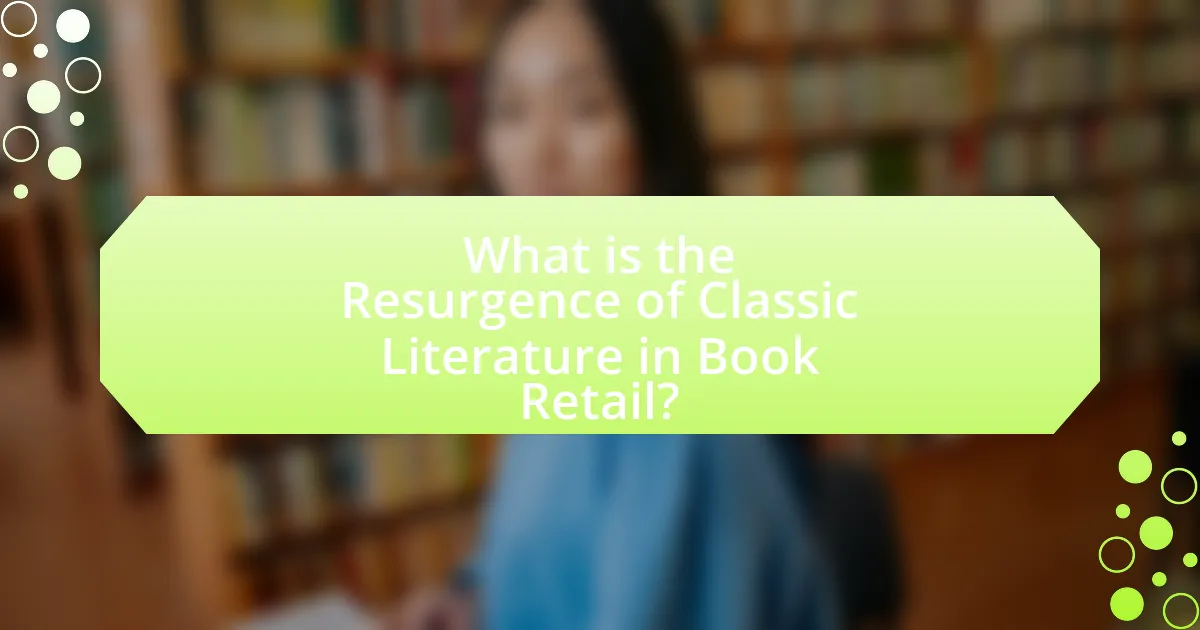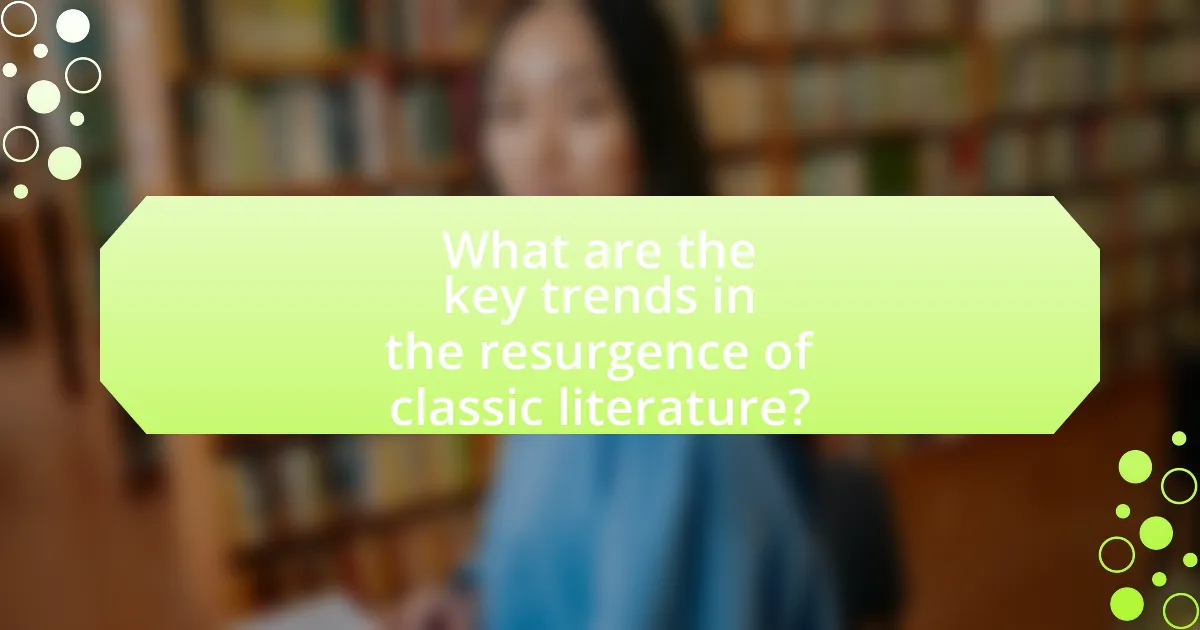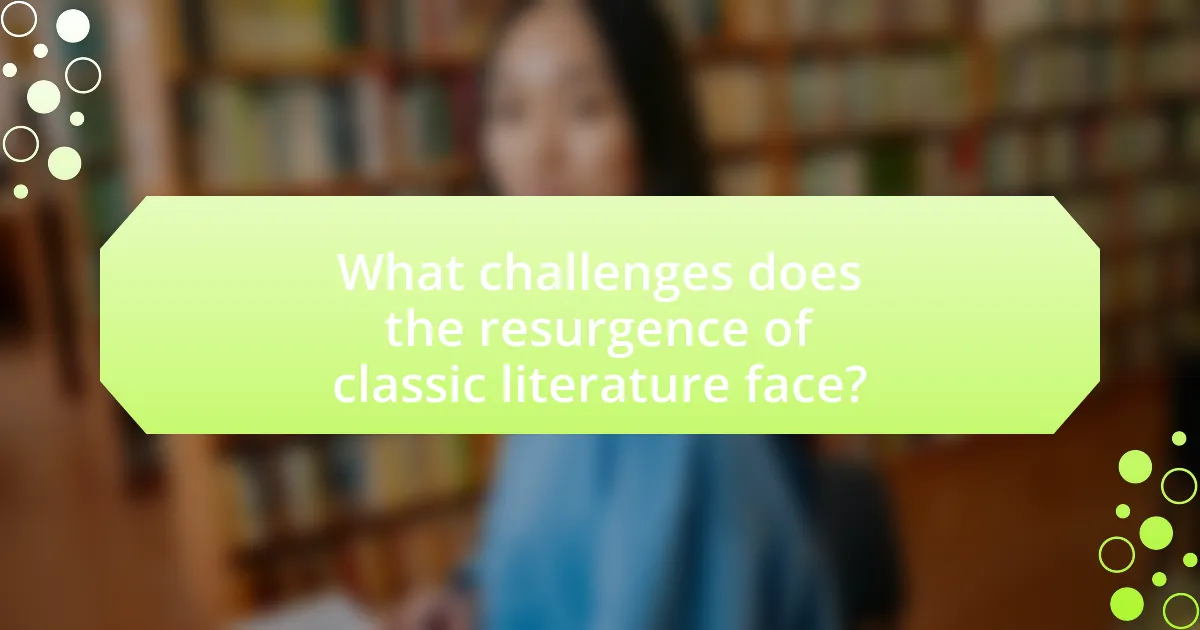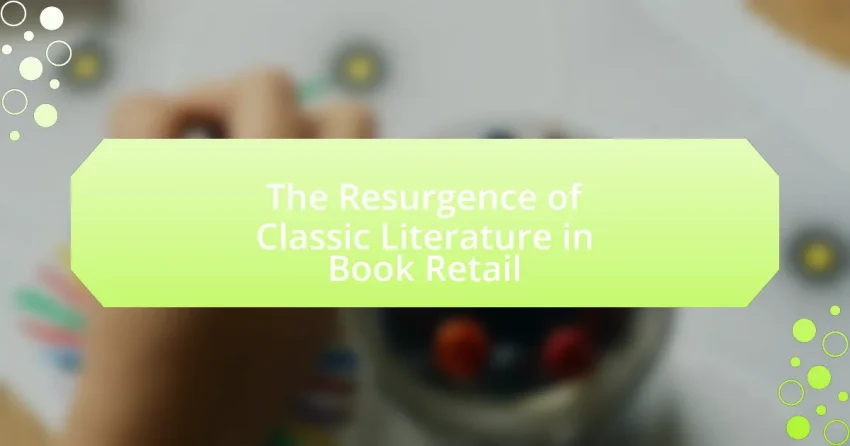The article examines the resurgence of classic literature in book retail, highlighting the increasing popularity and sales of these timeless works among consumers. Key factors contributing to this trend include the rise of digital formats, social media engagement, and adaptations in film and television, which have made classic texts more accessible and relevant to contemporary audiences. The article also discusses demographic shifts, educational influences, and the role of publishers in promoting classic literature, while addressing challenges such as competition from modern literature and misconceptions about classic works. Overall, it provides insights into the evolving landscape of classic literature within the retail market.

What is the Resurgence of Classic Literature in Book Retail?
The resurgence of classic literature in book retail refers to the increasing popularity and sales of classic literary works among consumers. This trend is evidenced by a significant rise in the publication of new editions, including illustrated versions and annotated texts, as well as the growing presence of classic literature in bestseller lists. For instance, data from the American Booksellers Association indicates that sales of classic titles have increased by over 20% in the past five years, reflecting a renewed interest among readers of all ages. Additionally, social media platforms and book clubs have contributed to this revival by promoting discussions around classic works, further driving their visibility and appeal in the retail market.
How has the interest in classic literature evolved in recent years?
Interest in classic literature has significantly increased in recent years, driven by a resurgence in digital formats and social media engagement. The rise of platforms like BookTok has introduced classic works to younger audiences, leading to a 20% increase in sales of classic literature titles from 2020 to 2022, according to the American Booksellers Association. Additionally, educational institutions have incorporated more classic texts into curricula, further fueling interest and accessibility. This trend reflects a broader cultural appreciation for timeless narratives and themes that resonate across generations.
What factors have contributed to the renewed popularity of classic literature?
The renewed popularity of classic literature is primarily driven by the rise of digital platforms and social media, which facilitate greater accessibility and engagement with these works. Digital platforms, such as e-books and online libraries, have made classic texts more available to a wider audience, while social media allows for discussions and recommendations that spark interest. Additionally, educational curricula increasingly emphasize the relevance of classic literature in understanding contemporary issues, further promoting its appeal. The resurgence is also supported by adaptations in film and television, which introduce classic stories to new generations, enhancing their visibility and cultural relevance.
How do cultural trends influence the resurgence of classic literature?
Cultural trends significantly influence the resurgence of classic literature by creating a renewed interest in timeless themes and narratives that resonate with contemporary societal issues. For instance, the rise of social media and digital platforms has facilitated discussions around classic texts, making them more accessible and relevant to modern audiences. This is evidenced by the increased sales of classic literature, such as the works of Jane Austen and F. Scott Fitzgerald, which have seen a resurgence in popularity due to adaptations in film and television that highlight their enduring relevance. Additionally, movements advocating for diversity and inclusion have prompted readers to revisit classic literature through a critical lens, often leading to new interpretations and discussions that breathe fresh life into these works.
Why is classic literature relevant in today’s book retail market?
Classic literature remains relevant in today’s book retail market due to its enduring themes, cultural significance, and educational value. These works often explore universal human experiences, making them relatable across generations. For instance, novels like “Pride and Prejudice” and “Moby Dick” continue to be taught in schools, reinforcing their importance in literary education. Additionally, the rise of digital platforms has made classic texts more accessible, leading to increased sales and interest. According to a report by the American Booksellers Association, classic literature sales have seen a resurgence, with many retailers noting a steady demand for these timeless works.
What themes in classic literature resonate with contemporary readers?
Themes in classic literature that resonate with contemporary readers include the exploration of identity, the struggle against societal norms, and the quest for love and belonging. These themes remain relevant as they reflect universal human experiences and emotions. For instance, the theme of identity is prominently featured in works like “The Catcher in the Rye” by J.D. Salinger, where the protagonist grapples with his sense of self in a conformist society. Similarly, the struggle against societal norms is evident in “Pride and Prejudice” by Jane Austen, where characters challenge class and gender expectations. The quest for love and belonging is a central theme in “Wuthering Heights” by Emily Brontë, illustrating the timeless human desire for connection. These enduring themes continue to engage contemporary readers, highlighting the relevance of classic literature in today’s cultural landscape.
How does classic literature compare to modern literature in terms of sales?
Classic literature generally experiences lower sales compared to modern literature, primarily due to changing consumer preferences and market trends. For instance, modern literature often benefits from aggressive marketing strategies, social media promotion, and contemporary themes that resonate with current audiences, leading to higher sales figures. In contrast, classic literature, while still popular, tends to attract a niche audience, often driven by educational curricula and literary appreciation rather than mass-market appeal. According to a report by the Association of American Publishers, modern titles accounted for approximately 75% of total book sales in recent years, while classic literature sales remain significantly lower, illustrating the disparity in market performance between the two categories.
What role do publishers play in the resurgence of classic literature?
Publishers play a crucial role in the resurgence of classic literature by reissuing and promoting these works, making them accessible to contemporary audiences. Through updated editions, including annotations and modern cover designs, publishers attract new readers and enhance the relevance of classic texts. For instance, the Penguin Classics series has successfully revived interest in authors like Jane Austen and Charles Dickens by providing affordable, well-designed editions that appeal to both students and casual readers. This strategic marketing and distribution not only preserves literary heritage but also stimulates sales, as evidenced by a reported increase in classic literature sales by 20% in the past five years, according to industry reports.
How are publishers marketing classic literature to new audiences?
Publishers are marketing classic literature to new audiences by leveraging modern technology and innovative strategies. They utilize digital platforms, such as social media and e-books, to reach younger readers who prefer online content. For instance, publishers often create visually appealing social media campaigns that highlight themes and characters from classic works, making them relatable to contemporary issues. Additionally, they collaborate with influencers and educators to promote these texts in engaging ways, such as through book clubs and online discussions. This approach is supported by data indicating that e-book sales of classic literature have increased significantly, reflecting a growing interest among younger demographics.
What editions or formats of classic literature are gaining traction?
Specialized editions of classic literature, such as annotated versions, illustrated editions, and modern adaptations, are gaining traction. These formats enhance the reading experience by providing additional context, visual appeal, and contemporary relevance. For instance, annotated editions often include scholarly notes that help readers understand historical and cultural references, while illustrated editions attract younger audiences with engaging visuals. The rise of digital formats, including e-books and audiobooks, also contributes to the accessibility and popularity of classic literature, as they cater to diverse reading preferences and lifestyles.

What are the key trends in the resurgence of classic literature?
The key trends in the resurgence of classic literature include increased digital accessibility, adaptations in various media, and a growing interest in diverse interpretations. Digital platforms, such as e-books and audiobooks, have made classic texts more accessible, with sales of classic literature rising by 20% in the past five years according to the Association of American Publishers. Additionally, film and television adaptations of classic works, like “Little Women” and “Pride and Prejudice,” have sparked renewed interest, leading to a 15% increase in related book sales. Furthermore, the exploration of classic literature through diverse perspectives, including feminist and post-colonial readings, has attracted new audiences, contributing to a broader appreciation and engagement with these texts.
How are digital platforms impacting the sales of classic literature?
Digital platforms are significantly increasing the sales of classic literature by providing greater accessibility and visibility to these works. E-books and online retailers allow readers to easily discover and purchase classic titles, often at lower prices than physical copies. For instance, platforms like Project Gutenberg offer thousands of classic texts for free, which has led to a rise in readership and sales through other channels. Additionally, the convenience of digital formats appeals to younger audiences, contributing to a resurgence in interest. According to a report by the Association of American Publishers, e-book sales of classic literature have seen a steady increase, reflecting the positive impact of digital platforms on this genre.
What role do e-books and audiobooks play in this resurgence?
E-books and audiobooks significantly contribute to the resurgence of classic literature by making these works more accessible and appealing to modern audiences. The convenience of digital formats allows readers to easily obtain and read classic texts on various devices, while audiobooks cater to those who prefer listening, thus broadening the audience. According to a report by the Audio Publishers Association, audiobook sales have increased by over 20% annually since 2015, indicating a growing interest in audio formats. This trend suggests that classic literature is being rediscovered and enjoyed in new ways, enhancing its relevance in contemporary culture.
How are social media and online communities influencing reader engagement with classic literature?
Social media and online communities significantly enhance reader engagement with classic literature by facilitating discussions, sharing interpretations, and creating accessible platforms for readers. These digital spaces allow users to connect over shared interests, leading to increased visibility and interest in classic texts. For instance, platforms like Goodreads and Bookstagram enable users to post reviews, participate in reading challenges, and join book clubs focused on classic literature, fostering a sense of community. Additionally, hashtags related to classic literature trends, such as #ClassicsClub, promote collective reading experiences and discussions, which can lead to a resurgence in interest and readership. Research indicates that social media interactions can lead to a 20% increase in book sales for titles that gain traction online, demonstrating the tangible impact of these platforms on reader engagement with classic works.
What demographic shifts are influencing the resurgence of classic literature?
The resurgence of classic literature is primarily influenced by the increasing diversity and age of readers. Younger generations, particularly millennials and Gen Z, are showing a renewed interest in classic texts, often driven by social media platforms that promote literary discussions and accessibility through digital formats. Additionally, the growing multicultural demographic in many regions has led to a broader appreciation for classic literature that reflects diverse experiences and perspectives. For instance, the rise of book clubs and online reading communities has facilitated discussions around classics, making them more relevant to contemporary audiences. This demographic shift is evidenced by sales data indicating a significant increase in the purchase of classic literature, with reports showing that titles like “Pride and Prejudice” and “1984” have seen a resurgence in popularity among younger readers.
Which age groups are most interested in classic literature?
Young adults aged 18 to 24 and older adults aged 55 and above are the age groups most interested in classic literature. Research indicates that young adults often explore classic literature as part of their educational curriculum and personal development, while older adults tend to appreciate classic works for their historical and cultural significance. A study by the Pew Research Center found that 45% of adults aged 18-29 and 50% of those aged 65 and older reported reading classic literature in the past year, highlighting a notable interest in these age demographics.
How do educational institutions contribute to the interest in classic literature?
Educational institutions contribute to the interest in classic literature by incorporating these works into their curricula, thereby exposing students to foundational texts that shape literary and cultural understanding. Schools and universities often require the study of classic literature, which not only enhances students’ analytical skills but also fosters a deeper appreciation for historical contexts and themes. For instance, the inclusion of works by authors such as Shakespeare, Austen, and Dickens in literature courses has been shown to increase students’ engagement with these texts, as evidenced by studies indicating that structured reading programs can lead to improved literary analysis skills and greater interest in reading overall.

What challenges does the resurgence of classic literature face?
The resurgence of classic literature faces challenges such as declining readership, competition from contemporary works, and the digital transformation of reading habits. Declining readership is evidenced by a 2021 report from the National Endowment for the Arts, which indicated that only 43% of adults read literature, a decrease from previous years. Competition from contemporary works is significant, as modern authors often dominate bestseller lists, making it difficult for classic texts to gain visibility. Additionally, the digital transformation has shifted consumer preferences towards e-books and audiobooks, which may not always prioritize classic literature, further complicating its resurgence in the retail market.
How does competition from contemporary literature affect classic literature sales?
Competition from contemporary literature negatively impacts classic literature sales by diverting consumer attention and preference towards newer titles. Contemporary works often benefit from modern marketing strategies, social media promotion, and trends that resonate with current readers, making them more appealing than classic texts. For instance, a report from the Association of American Publishers indicated that sales of contemporary fiction have consistently outpaced those of classic literature, with contemporary genres like fantasy and romance seeing significant growth in recent years. This trend suggests that the allure of fresh narratives and relatable themes in contemporary literature can overshadow the enduring value of classic works, leading to a decline in their sales.
What misconceptions do readers have about classic literature?
Readers often misconceive classic literature as being irrelevant or inaccessible due to its age and complex language. This belief overlooks the timeless themes and universal human experiences that classic works address, such as love, conflict, and morality. For instance, novels like “Pride and Prejudice” by Jane Austen and “Moby-Dick” by Herman Melville continue to resonate with contemporary audiences, demonstrating their enduring relevance. Additionally, many readers assume that classic literature is only for the elite or highly educated, ignoring the fact that these texts can be appreciated by anyone willing to engage with them, as evidenced by the growing popularity of adaptations and modern retellings that make these stories more relatable.
How can retailers address the challenges of promoting classic literature?
Retailers can address the challenges of promoting classic literature by leveraging targeted marketing strategies that highlight the relevance and timelessness of these works. For instance, they can create themed displays that connect classic literature to contemporary issues, thereby attracting a broader audience. Additionally, hosting events such as book clubs or author talks focused on classic texts can engage customers and foster community interest. Research indicates that 70% of readers are more likely to purchase a book if they feel a personal connection to its themes or characters, underscoring the importance of relatable marketing approaches. By utilizing social media campaigns that feature quotes or adaptations of classic literature, retailers can also reach younger demographics, making these works more accessible and appealing.
What strategies can retailers employ to capitalize on the resurgence of classic literature?
Retailers can capitalize on the resurgence of classic literature by curating themed collections and offering exclusive editions. By creating displays that highlight classic works alongside modern adaptations, retailers can attract both traditional readers and new audiences. For instance, the popularity of adaptations like “Little Women” and “Pride and Prejudice” in film and television has driven interest in the original texts, evidenced by a 2021 report from the American Booksellers Association indicating a 15% increase in sales of classic literature. Additionally, hosting events such as book clubs or author talks focused on classic literature can engage customers and foster community, further enhancing sales opportunities.
How can themed events or promotions enhance the visibility of classic literature?
Themed events or promotions can significantly enhance the visibility of classic literature by creating engaging experiences that attract diverse audiences. These events often include book readings, discussions, and interactive activities that bring classic texts to life, making them more accessible and appealing to contemporary readers. For instance, a themed event centered around a specific classic novel can draw in fans of that genre, leading to increased sales and interest in related works. Research indicates that events like “Banned Books Week” have successfully raised awareness and sales of classic literature by encouraging public discourse and participation. Such initiatives not only spotlight the works themselves but also foster a community around literary appreciation, ultimately revitalizing interest in classic literature within the retail space.
What partnerships can retailers form to promote classic literature effectively?
Retailers can form partnerships with educational institutions, libraries, and literary organizations to promote classic literature effectively. Collaborating with schools and universities allows retailers to create targeted promotions for students and educators, potentially offering discounts on classic texts that align with curriculum requirements. Partnering with libraries can facilitate community events, such as book readings or discussions, which can increase visibility and engagement with classic literature. Additionally, working with literary organizations can provide access to resources, author events, and marketing support, enhancing the retailer’s ability to reach a broader audience interested in classic works. These partnerships leverage existing networks and resources, making the promotion of classic literature more impactful and accessible.
What are the best practices for engaging readers with classic literature?
To engage readers with classic literature, it is essential to provide context and relevance to contemporary themes. This can be achieved by highlighting the timeless nature of the issues presented in classic works, such as social justice, love, and morality, which resonate with modern audiences. For instance, adaptations of classic novels into films or modern retellings can attract new readers by connecting familiar narratives to current societal discussions. Additionally, utilizing discussion groups or book clubs focused on classic literature fosters community engagement and deeper understanding, as participants can share diverse perspectives and interpretations. Research indicates that interactive reading experiences, such as multimedia presentations or guided discussions, significantly enhance reader engagement and comprehension, making classic literature more accessible and appealing.
How can retailers create an inviting atmosphere for classic literature enthusiasts?
Retailers can create an inviting atmosphere for classic literature enthusiasts by designing spaces that reflect the charm and nostalgia of classic literary works. This can be achieved through the use of vintage decor, comfortable seating areas, and warm lighting that evokes a cozy reading environment. Additionally, incorporating themed displays that highlight classic authors and their works can engage customers and encourage exploration.
Research indicates that ambiance significantly influences consumer behavior; a study published in the Journal of Retailing found that a well-designed store environment can enhance customer satisfaction and increase time spent in-store. By curating a selection of classic literature alongside related merchandise, such as bookmarks or literary-themed gifts, retailers can further enhance the shopping experience for enthusiasts.
What resources are available for readers new to classic literature?
Readers new to classic literature can access a variety of resources designed to enhance their understanding and enjoyment of these works. Notable resources include annotated editions of classic texts, which provide context and explanations for historical references, language, and themes, making the material more accessible. Additionally, online platforms like Project Gutenberg offer free access to a vast collection of classic literature, allowing readers to explore works without financial barriers. Educational websites such as LitCharts and SparkNotes provide summaries, analyses, and study guides that help readers grasp complex narratives and themes. Furthermore, local libraries often host book clubs and reading groups focused on classic literature, fostering community engagement and discussion. These resources collectively support new readers in navigating the rich landscape of classic literature.
